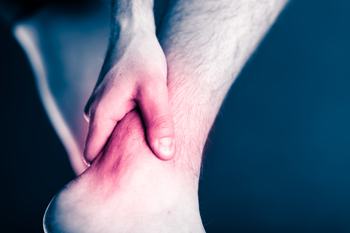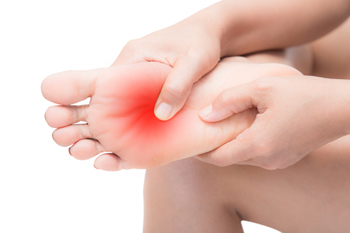Items filtered by date: June 2021
How Does Diabetes Affect the Feet?
Although diabetes stems from the pancreas, it is a systemic condition that affects the whole body, including the feet. There are many foot health problems that are associated with diabetes or that are more likely to occur in diabetics. These include poor circulation and nerve damage, which can lead to poorly healing foot wounds or diabetic foot ulcers, corns and calluses, dry or cracked heels, ingrown toenails, fungal infections, hammertoes and bunions, and charcot foot. When caught early, many of these problems can be treated or managed. Inspecting the feet daily for any abnormalities can help detect potential issues. If you have diabetes and notice any pain, numbness, tingling, discoloration, rashes, deformities, or wounds on your feet, it is suggested that you seek the care of a podiatrist as soon as possible.
Diabetic foot care is important in preventing foot ailments such as ulcers. If you are suffering from diabetes or have any other concerns about your feet, contact the foot specialists from Podiatry Associates of Belleville. Our doctors can provide the care you need to keep you pain-free and on your feet.
Diabetic Foot Care
Diabetes affects millions of people every year. The condition can damage blood vessels in many parts of the body, especially the feet. Because of this, taking care of your feet is essential if you have diabetes, and having a podiatrist help monitor your foot health is highly recommended.
The Importance of Caring for Your Feet
- Routinely inspect your feet for bruises or sores.
- Wear socks that fit your feet comfortably.
- Wear comfortable shoes that provide adequate support.
Patients with diabetes should have their doctor monitor their blood levels, as blood sugar levels play such a huge role in diabetic care. Monitoring these levels on a regular basis is highly advised.
It is always best to inform your healthcare professional of any concerns you may have regarding your feet, especially for diabetic patients. Early treatment and routine foot examinations are keys to maintaining proper health, especially because severe complications can arise if proper treatment is not applied.
If you have any questions please feel free to contact our office located in Belleville, NJ . We offer the newest diagnostic and treatment technologies for all your foot and ankle needs.
How Peripheral Neuropathy May Affect Your Feet
 Peripheral neuropathy is a condition characterized by nerve damage to the nerves of the feet. It is a common condition among people with diabetes, affecting approximately half of all diabetics. Peripheral neuropathy could cause a variety of symptoms in your lower limbs, including burning, tingling, or pins and needles sensations in your feet, numbness, weakness, and pain. A loss of sensation or increased sensitivity to touch are also common. All of these can lead to changes in the way that you walk, affect your balance, lead to a loss of muscle tone in the lower limbs, and cause swelling in the feet. If you have peripheral neuropathy, practicing good foot care will be especially important for keeping your feet healthy and maintaining your mobility and independence. It is suggested that you consult with a podiatrist, who can help you take care of your feet.
Peripheral neuropathy is a condition characterized by nerve damage to the nerves of the feet. It is a common condition among people with diabetes, affecting approximately half of all diabetics. Peripheral neuropathy could cause a variety of symptoms in your lower limbs, including burning, tingling, or pins and needles sensations in your feet, numbness, weakness, and pain. A loss of sensation or increased sensitivity to touch are also common. All of these can lead to changes in the way that you walk, affect your balance, lead to a loss of muscle tone in the lower limbs, and cause swelling in the feet. If you have peripheral neuropathy, practicing good foot care will be especially important for keeping your feet healthy and maintaining your mobility and independence. It is suggested that you consult with a podiatrist, who can help you take care of your feet.
Neuropathy
Neuropathy can be a potentially serious condition, especially if it is left undiagnosed. If you have any concerns that you may be experiencing nerve loss in your feet, consult with the foot specialists from Podiatry Associates of Belleville. Our doctors will assess your condition and provide you with quality foot and ankle treatment for neuropathy.
What Is Neuropathy?
Neuropathy is a condition that leads to damage to the nerves in the body. Peripheral neuropathy, or neuropathy that affects your peripheral nervous system, usually occurs in the feet. Neuropathy can be triggered by a number of different causes. Such causes include diabetes, infections, cancers, disorders, and toxic substances.
Symptoms of Neuropathy Include:
- Numbness
- Sensation loss
- Prickling and tingling sensations
- Throbbing, freezing, burning pains
- Muscle weakness
Those with diabetes are at serious risk due to being unable to feel an ulcer on their feet. Diabetics usually also suffer from poor blood circulation. This can lead to the wound not healing, infections occurring, and the limb may have to be amputated.
Treatment
To treat neuropathy in the foot, podiatrists will first diagnose the cause of the neuropathy. Figuring out the underlying cause of the neuropathy will allow the podiatrist to prescribe the best treatment, whether it be caused by diabetes, toxic substance exposure, infection, etc. If the nerve has not died, then it’s possible that sensation may be able to return to the foot.
Pain medication may be issued for pain. Electrical nerve stimulation can be used to stimulate nerves. If the neuropathy is caused from pressure on the nerves, then surgery may be necessary.
If you have any questions, please feel free to contact our office located in Belleville, NJ . We offer the newest diagnostic and treatment technologies for all your foot care needs.
Understanding Foot Biomechanics
Biomechanics is a field of study relating to how the body moves. Foot biomechanics studies how the structures of the foot work in tandem to perform timely functions, and how the feet interact with the lower leg. Feet act as mobile adaptors—absorbing shock to keep stress off the ankle, leg, knee and spine, while adapting to uneven surfaces—and as rigid levers allowing for a strong push-off during walking. When a person’s biomechanics work properly, they can move, walk, run and jump without pain or dysfunction. If you have any pain or immobility in your feet or ankles during these activities, contact a podiatrist. A biomechanical evaluation and gait analysis may help identify structural or functional abnormalities contributing to any dysfunction.
If you have any concerns about your feet, contact the foot specialists from Podiatry Associates of Belleville. Our doctors can provide the care you need to keep you pain-free and on your feet.
Biomechanics in Podiatry
Podiatric biomechanics is a particular sector of specialty podiatry with licensed practitioners who are trained to diagnose and treat conditions affecting the foot, ankle and lower leg. Biomechanics deals with the forces that act against the body, causing an interference with the biological structures. It focuses on the movement of the ankle, the foot and the forces that interact with them.
A History of Biomechanics
- Biomechanics dates back to the BC era in Egypt where evidence of professional foot care has been recorded.
- In 1974, biomechanics gained a higher profile from the studies of Merton Root, who claimed that by changing or controlling the forces between the ankle and the foot, corrections or conditions could be implemented to gain strength and coordination in the area.
Modern technological improvements are based on past theories and therapeutic processes that provide a better understanding of podiatric concepts for biomechanics. Computers can provide accurate information about the forces and patterns of the feet and lower legs.
Understanding biomechanics of the feet can help improve and eliminate pain, stopping further stress to the foot.
If you have any questions please feel free to contact our office located in Belleville, NJ . We offer the newest diagnostic and treatment technologies for all your foot and ankle needs.
Arthritis Can Cause Pain in the Feet and Ankles
What Causes Morton’s Neuroma?
When the digital nerve—which is responsible for sensation in the toes—becomes compressed and persistently inflamed, a thickened mass of tissue may form around the irritated part of the nerve. This growth typically occurs between the third and fourth toes, and may make you feel as if you are walking on a marble. This condition is known as Morton's Neuroma. Other symptoms may include pain in the ball of the foot, tingling or numbness in the toes, or a burning pain in between the toes. Because high heels and pointy-toed shoes can squeeze the toes together and compress the digital nerve, women who wear these types of shoes on a regular basis—as well as those who engage in activities that put repeated pressure on the nerve—are more likely to develop Morton’s Neuroma. To reduce your risks, wear lower-heeled shoes with ample space in the toe box, treat foot conditions like bunions and hammertoe, and avoid repetitive motions that apply pressure to that area. If you have any of the symptoms associated with Morton’s Neuroma that last for more than a few days, contact a podiatrist.
Morton’s neuroma is a very uncomfortable condition to live with. If you think you have Morton’s neuroma, contact the foot specialists of Podiatry Associates of Belleville. Our doctors will attend to all of your foot care needs and answer any of your related questions.
Morton’s Neuroma
Morton's neuroma is a painful foot condition that commonly affects the areas between the second and third or third and fourth toe, although other areas of the foot are also susceptible. Morton’s neuroma is caused by an inflamed nerve in the foot that is being squeezed and aggravated by surrounding bones.
What Increases the Chances of Having Morton’s Neuroma?
- Ill-fitting high heels or shoes that add pressure to the toe or foot
- Jogging, running or any sport that involves constant impact to the foot
- Flat feet, bunions, and any other foot deformities
Morton’s neuroma is a very treatable condition. Orthotics and shoe inserts can often be used to alleviate the pain on the forefront of the feet. In more severe cases, corticosteroids can also be prescribed. In order to figure out the best treatment for your neuroma, it’s recommended to seek the care of a podiatrist who can diagnose your condition and provide different treatment options.
If you have any questions, please feel free to contact our office located in Belleville, NJ . We offer the newest diagnostic and treatment technologies for all your foot care needs.
What Are Different Causes of Ankle Pain?
 Pain can be felt immediately when an ankle injury occurs. The ankle joint typically supports the majority of the body weight, and many people often realize this when an ankle injury is endured. Research has indicated there are three bones that connect in the ankle joint. These are connected by several tendons and ligaments that protect the ankle joint. Many patients experience ankle pain through sprains or fractures in addition to arthritis, possibly causing chronic ankle pain. Symptoms of a broken ankle can include immediate bruising and swelling, and it can often become difficult to walk. Rolling or twisting the ankle can result in a sprain, which can be treated by numerous methods. If you have ankle pain, it is strongly suggested that you consult with a podiatrist as quickly as possible so they can determine what the best course of treatment is for you.
Pain can be felt immediately when an ankle injury occurs. The ankle joint typically supports the majority of the body weight, and many people often realize this when an ankle injury is endured. Research has indicated there are three bones that connect in the ankle joint. These are connected by several tendons and ligaments that protect the ankle joint. Many patients experience ankle pain through sprains or fractures in addition to arthritis, possibly causing chronic ankle pain. Symptoms of a broken ankle can include immediate bruising and swelling, and it can often become difficult to walk. Rolling or twisting the ankle can result in a sprain, which can be treated by numerous methods. If you have ankle pain, it is strongly suggested that you consult with a podiatrist as quickly as possible so they can determine what the best course of treatment is for you.
Ankle pain can be caused by a number of problems and may be potentially serious. If you have ankle pain, consult with the foot specialists from Podiatry Associates of Belleville. Our doctors will assess your condition and provide you with quality foot and ankle treatment.
Ankle pain is any condition that causes pain in the ankle. Due to the fact that the ankle consists of tendons, muscles, bones, and ligaments, ankle pain can come from a number of different conditions.
Causes
The most common causes of ankle pain include:
- Types of arthritis (rheumatoid, osteoarthritis, and gout)
- Ankle sprains
- Broken ankles
- Achilles tendinitis
- Achilles tendon rupture
- Stress fractures
- Bursitis
- Tarsal tunnel syndrome
- Plantar fasciitis
Symptoms
Symptoms of ankle injury vary based upon the condition. Pain may include general pain and discomfort, swelling, aching, redness, bruising, burning or stabbing sensations, and/or loss of sensation.
Diagnosis
Due to the wide variety of potential causes of ankle pain, podiatrists will utilize a number of different methods to properly diagnose ankle pain. This can include asking for personal and family medical histories and of any recent injuries. Further diagnosis may include sensation tests, a physical examination, and potentially x-rays or other imaging tests.
Treatment
Just as the range of causes varies widely, so do treatments. Some more common treatments are rest, ice packs, keeping pressure off the foot, orthotics and braces, medication for inflammation and pain, and surgery.
If you have any questions, please feel free to contact our office located in Belleville, NJ . We offer the newest diagnostic and treatment technologies for all your foot care needs.



